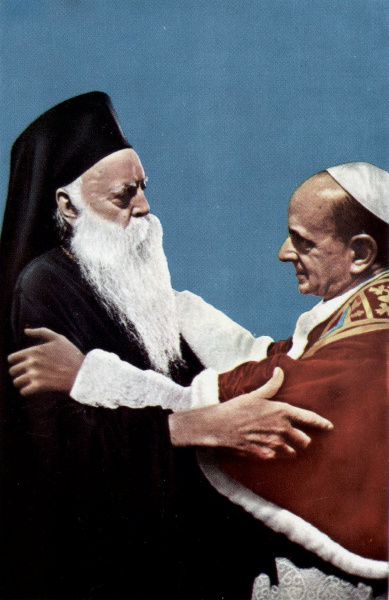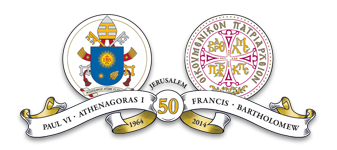
Ecumenical Patriarch Athenagora and Pope Paul VI in 1964.
Photo Courtesy of the Archives of the Greek Orthodox Archdiocese of America
By Fr. Thomas FitzGerald
Pope Francis and Ecumenical Patriarch will soon journey to the Holy Land where they will meet in Jerusalem on May 24-26.
This pilgrimage commemorates the 50th Anniversary of the meeting between Pope Paul VI and Ecumenical Patriarch Athenagoras in 1964. That blessed encounter captured the attention of the Christian world. As the first meeting between a Pope and an Ecumenical Patriarch since 1438, it marked a dramatic turn for the churches from alienation to engagement.
Ecumenical Patriarch Bartholomew recently said: "This 50th anniversary of the historic meeting between the late Pope Paul VI and our ever-memorable predecessor Patriarch Athenagoras is an exceptional opportunity to deepen the fraternal bonds between Peter and Andrew, for both our Sees owe their foundations to them. For this reason, following in the footsteps of Pope Paul VI and Patriarch Athenagoras, we express our desire to further the relations between the Roman Catholic and the Orthodox Churches."
After the formal break in communion in 1484, the two churches had limited opportunities for contact and dialogue. Serious differences centered chiefly upon the Catholic Church's Filioque addition to the Nicene-Constantinople Creed of 381 and the authority of the Bishop of Rome beyond his canonical territory. These factors were eventually compounded especially by the tragic situation of the Patriarchate of Constantinople under Ottoman rule from the fifteenth century and Protestant Reformation in the Christian West in the sixteenth century.
The May meeting in Jerusalem will be a sacred opportunity for Pope Francis and Ecumenical Patriarch Bartholomew to pray together and to thank God for the pilgrimage towards reconciliation that the Catholic and Orthodox churches have travelled in only fifty years. Both churches recognize that disunity is contrary to the will of the Lord who prayed for the unity of his followers. (Jn. 17:11).
During the past five decades, both churches have come to see themselves as ‘sister churches' that have a solemn obligation to heal their division so that they may give a common witness to Christ and His Gospel.
This new relationship between the churches has been expressed in many ways. The Catholic Second Vatican Council, 1962-65, and the Orthodox Pan-Orthodox Conferences, 1961-68, highlighted a new desire for reconciliation between the churches. The limited Anathemas of 1054 were lifted by Rome and Constantinople in 1965 as an expression of this desire.
Since that time, meetings have taken place between representatives of Rome and the Ecumenical Patriarchate on the feasts of Sts. Peter and Paul on June 29 and the Feast of St. Andrew on Nov. 30.
In addition, the meetings between Popes and Ecumenical Patriarchs in Rome and Constantinople also have taken place on a regular basis. The presence of Ecumenical Patriarch Bartholomew at the installation ceremonies of Pope France on March 20, 2013 continued this important tradition.
A formal theological dialogue between Orthodox and Catholic theologians was established by the churches in the United States in 1965. This was followed by the beginning of an international dialogue in 1979. Nurtured by prayer, both dialogues have examined the points of theological agreement and divergence between the two churches.
These theological dialogues are of great importance. Both churches affirm that the restoration of full communion between them can only take place through a common agreement of the historic Apostolic Faith.
As an expression of reconciliation, the Catholic Church has returned to the Orthodox many holy relics that had been taken from Constantinople especially at the time of the crusades. Ecumenical Patriarch Bartholomew received the relics of St. John Chrysostom and St. Gregory the Theologian from the late Pope John Paul II in 2004.
At the level of parish life, many Orthodox and Catholic believers have found opportunities to pray together for unity, to know each other better through study groups, and to respond together to the needs of the society. Orthodox and Catholic clergy and laity also have taken part in pilgrimages to Rome and Constantinople.
When Pope France and Ecumenical Patriarch Bartholomew meet in Jerusalem they will have an opportunity to affirm the dramatic developments that have taken place between the churches in the past fifty years. In so doing, they will also have a unique blessing to reaffirm the churches commitment to the restoration of full communion and their witness to reconciliation in the world today.
Rev. Dr. Thomas FitzGerald, Protopresbyter of the Ecumenical Patriarchate, is professor of church history and historical theology and former Holy Cross School of Theology dean. He is the Orthodox executive secretary of the North American Orthodox-Catholic Bilateral Consultation in North America.
